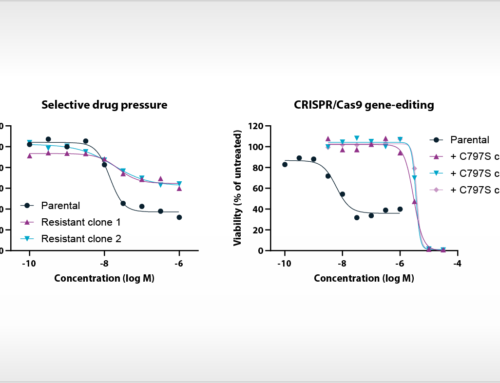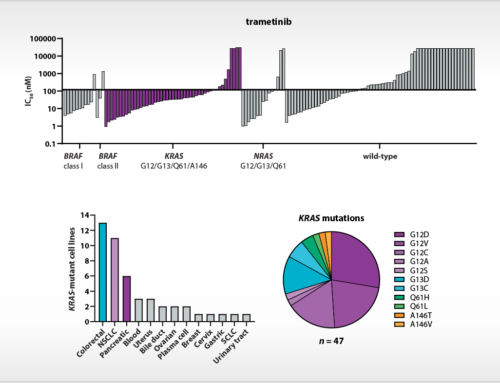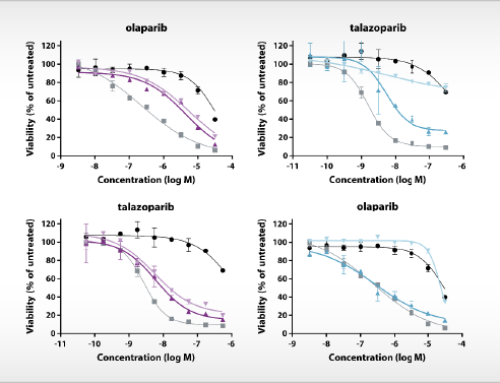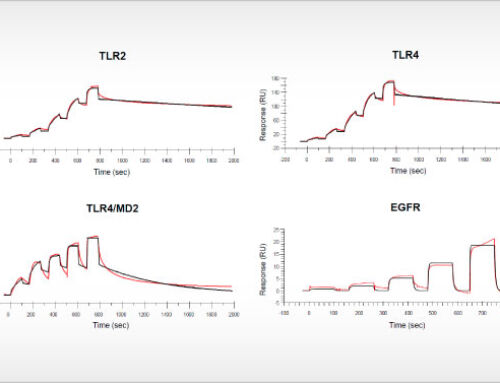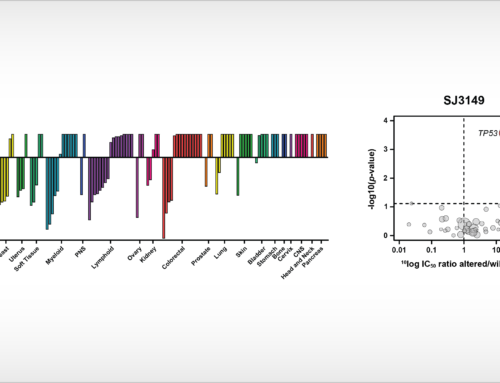Oss, March 20th, 2014 – Over the past decade targeted therapies have significantly increased the efficiency of cancer therapy. They bring great benefit to patients because they improve survival rates with much less side effects than traditional cytotoxic therapies. A prime example of the success of targeted therapy are small molecule inhibitors of protein kinases. There are currently twenty-five kinase inhibitors approved for clinical use. Studies on their selectivity and targeting are often difficult to compare, and for some approved drugs even not available in the public domain.
In a publication which has appeared today in PLOS ONE, NTRC presents a comprehensive, comparative analysis of all marketed kinase inhibitors with respect to their cellular and biochemical selectivity, and their relative efficacy in inhibiting oncogene-driven cell growth, i.e., their ‘targeting efficacy’ (Reference: PLOS ONE 9(3): e92146). The publication contains the Oncolines™ profiles of all twenty-five kinase inhibitor drugs, as well as their full kinome profiles determined in a panel of more than 300+ kinase activity assays at NTRC’s strategic partner in Japan, Carna Biosciences, Inc. (www.carnabio.com). The study in PLOS ONE provides novel drug sensitivity markers for inhibitors of EGFR and MEK, and shows that there are large differences in the targeting efficacy of different drugs designed to target BRAF, ABL1 or EGFR. It also shows that there is still room for improvements in targeting efficacies. The profiling in the panel of 300+ kinase enzyme assays was used for a comparative ranking of the selectivity and potency of all inhibitors. Another important contribution of the study is the comprehensive kinase and cellular profiling of cabozantinib (Cometriq®; Exelixis), dabrafenib (Tafinlar®; GlaxoSmithKline), ponatinib (Iclusig®; Ariad), regorafenib (Stivarga®; Bayer), trametinib (Mekinist®; GlaxoSmithKline) and vemurafenib (Zelboraf®; Roche), which was lacking in the public domain.
The combination of cell panel and biochemical panel data generate new insight in the relation between spectrum-selectivity of kinase inhibitors and cellular targeting efficacy. A new approach is described to computationally link biochemical and cellular profiles, in order to discover specific multi-kinome profiles that enhance targeting efficacy.
Oncolines™ cancer cell line profiling is offered by NTRC as a commercial service to customers from pharmaceutical industries, biotech and universities by NTRC. Kinase profiling in enzyme activity assays is offered as a commercial service by Carna. In Europe, NTRC represents Carna’s kinase profiling services and its proteomics by reverse phase protein array (RPPA) service.
The development of Oncolines™ cancer cell line panel was supported by a grant from the Innovation Office (Agentschap NL) of the Ministry of Economic Affairs of the Netherlands (INT 111039).
NTRC is a privately-owned biotech company based at the Pivot Park, in Oss, The Netherlands. NTRC (Netherlands Translational Research Center B.V.) translates scientific ideas with regard to the treatment of human disease into small molecule drug candidates, by making use of its proprietary technology platforms Oncolines™, SynergyFinder™, and EntropySelect™. For more information on NTRC Services, see the website of NTRC www.ntrc.nl, or send an e-mail to services@ntrc.nl.


